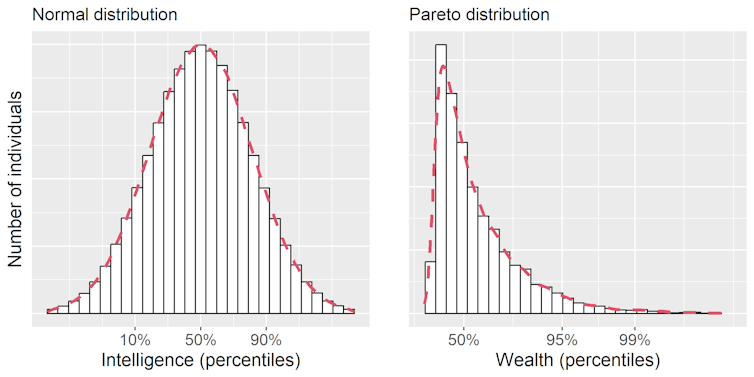From White Lotus to Succession, there’s high demand for television dramas about the super rich. The characters on these shows are typically portrayed as entitled, hollow and sad. But they aren’t necessarily depicted as unintelligent. So are rich people rich because they are smart?
In the middle of a cost-of-living crisis in the United Kingdom, this question goes beyond scientific curiosity and touches something deeper.
If people’s net worth were only the consequence of their intelligence, the gigantic wealth gap we see in our society might be perceived as less intolerable – at least by some. Inequality would be the price to pay for having the smartest lead us all to a better future.
There is little doubt that intelligence contributes to one’s economic and professional success. Take self-made billionaires Elon Musk, Jeff Bezos and Ray Dalio, just to name a few. It would be surprising if top innovators in advanced fields such as tech and finance turned out to be average.
In fact, intelligence is the best predictor of both educational achievement and work performance. And academic and professional success is, in turn, a fairly good forecaster of income. But that’s not the whole story.
Not all highly intelligent people are primarily driven by a desire for wealth – they often have a thirst for knowledge. Some may instead opt for comparatively less well paying jobs that are more intellectually rewarding, such as architecture, engineering or research. A recent Swedish study showed that cognitive test scores of the top 1% of earners were not significantly different to the scores obtained by those who earned slightly less.
But to what extent does intelligence boost wealth? Before diving into the evidence, we must clarify what researchers mean by “intelligence”. Intelligence can be defined as the ability to perform a wide range of cognitive tests successfully. And these seem to be linked. If someone is good at resolving a particular cognitive test, they will probably perform well in other cognitive tests too.

Intelligence is not a monolithic trait, though. In fact, it consists of at least two broad constructs: fluid intelligence and crystalized intelligence. Fluid intelligence taps into core cognitive mechanisms, such as the speed of processing stimuli, memory capacity and abstract reasoning. Conversely, crystalized intelligence refers to those skills developed in a social environment, such as literacy, numeracy and knowledge about specific topics.
This distinction matters because these two types of intelligence develop in different ways. Fluid intelligence can be inherited, cannot be boosted and decreases fairly quickly with age. By contrast, crystalized intelligence increases throughout most adulthood and starts declining only after about 65 years.
But fluid intelligence helps build up crystalized intelligence. Fluid intelligence represents the brain’s capacity of acquiring and elaborating information. Crystalized intelligence is, to a large extent, acquired information.
This means that if your reasoning skills are sharp, then you will process new information quickly. You will integrate novel information with old information accurately. Ultimately, this will speed up learning of any discipline and contribute to your academic and financial success.
Education is a factor
That said, innate capabilities are not the only thing that matters. Another significant factor is education.
A quantitative review has established that the more years of schooling, the higher students’ intelligence scores. Crucially, these improvements stem from training in specific skills rather than enhancing general intellectual ability. So school teaches you useful stuff for both professional success and performing intelligence tests.
Unsurprisingly, education in turn is affected by family socioeconomic status. For example, expensive schools and private tutors provide the student highly efficient personalized instruction. Access to top quality education may therefore make a huge difference in future income.
Of course, the influence of family socioeconomic status on wealth does not operate solely through education. Inheritance and networks are among the most obvious mechanisms. This is particularly true for entrepreneurs, whose investing potential and connections are fundamental for business success.
The role of luck
So intelligence, education and socioeconomic status all affect one’s income. However, these factors alone are unlikely to fully account for the individual differences in wealth. In fact, a recent study suggests that luck exerts a significant impact.
This study highlights that the statistical distribution of wealth differs from the distribution of intelligence. Intelligence is “normally distributed,” with most individuals being around average. By contrast, wealth follows a “pareto distribution,” a formula which shows that 80% of a country’s wealth is in the hands of only 20% of the population.
Intelligence versus wealth distribution

The study does not downplay the role of intelligence (or talent in general). A fine intellectual ability improves the chances of getting rich. Nonetheless, intelligence is no guarantee of getting rich. Furthermore, a series of fortunate events can clearly turn unremarkable individuals into high earners.
That is, when it comes to getting rich, intelligence is neither sufficient nor necessary. But it does help.
“I’d rather be lucky than good,” says the character Chris Wilton (Jonathan Rhys Meyers) in Woody Allen’s film Match Point. In the light of the evidence we have just reviewed, he may be right. Being born into a wealthy and highly educated family is a fortunate event. Likewise, random strokes of luck (like winning the lottery) do not come from years of hard work. We may even push the argument a bit further and conclude that being intelligent is a form of luck itself.
Many things that contribute to achieving financial success are beyond our control. Most, if not all, extremely wealthy people have been blessed by Lady Luck somehow.
Conversely, making the most of what luck brings us certainly matters. Granted, a good deal of individuals merely cash in the benefits of inherited privilege.
Regardless, many small and big fortunes stem from an intelligent use of the resources we are lucky to have been gifted with – whether they are intellectual, educational or socioeconomic.![]()
Article written by Giovanni Sala, Lecturer in Psychology, University of Liverpool and Fernand Gobet, Professorial Research Fellow of Psychology, London School of Economics and Political Science
This article is republished from The Conversation under a Creative Commons license. Read the original article.

It is a very sick society that measures “success” by how much money one has.
Bezos and Musk are both very smart. They realised that the quickest way to make money is to rip off the ordinary person by taking their taxes. Bezos would have nothing if not for the US postal service. The USPS provided a distribution system at a ridiculously low price and was hugely subsidised by the taxpayer. You paid for Amazon success.
Musk has made ALL his money from the government subsidies and contracts. Yes he is smarter than the average bureaucrat, (not a very difficult thing to achieve) but without the subsidies not a single car, not a single rocket would have been developed or sold. He knows full well that electric cars are totally nonsensical from a transportation view. He knows Space rockets have no economic value but merely are toys for warmongers. He knows that the Satellites, GPS and Internet are nice but un-necessary luxuries which can and are being used as control mechanisms and not as tools for human advancement.
I don’t fault their intelligence, but their ethics and morality is nothing that I would want against my reckoning.
The article is in agreement with “The Bell Curve ” in which book , after many objective studies – such as twins being adopted into different families with dissimilar social and educational characteristics, the authors concluded that IQ was at least 60% and possibly 80% inherited. This of course, is never accepted by the Left , which believes that success in life is a consequence of social privilege. Well actually that privilege is due to the smart ie high IQ parents having good social status and income ,then passing their genes and social benefits on to their children . Tall parents usually have tall kids. Smart parents …… Further, It was found that IQ is a prime determinant of success in many of life’s facets …career Income , health, longevity. Society would proceed more smoothly if IQ was recognised ,as is physical ability for being an accurate determinant of ability
The blog post explores the relationship between wealth and intelligence, discussing a study that suggests a correlation between higher socioeconomic status and higher cognitive abilities. It’s an interesting topic that raises questions about the interplay between intelligence and socioeconomic factors. I appreciate the author for sharing this thought-provoking study.
Where does hard work enter the picture.